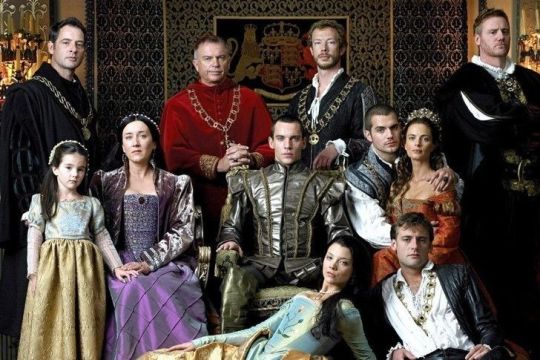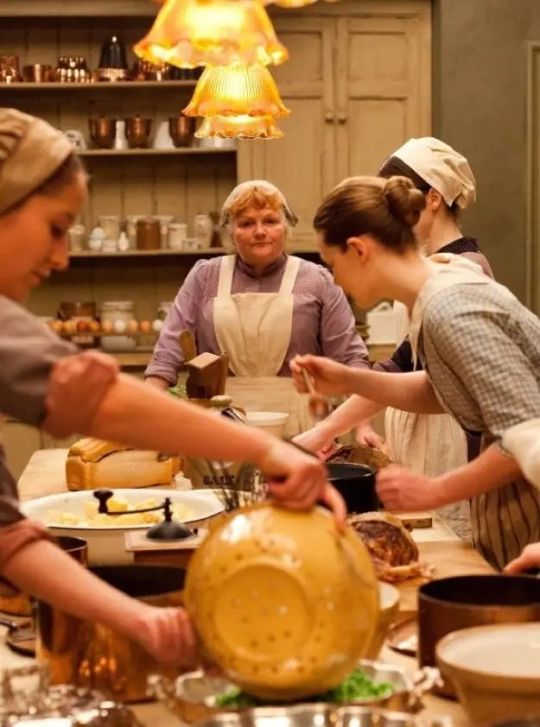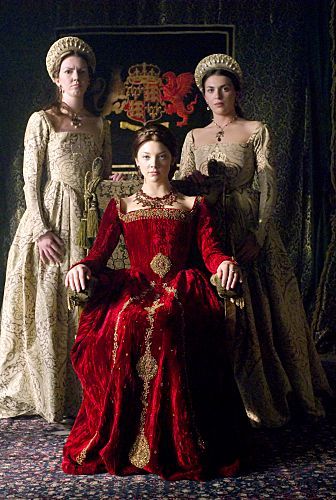Don't wanna be here? Send us removal request.
Text
Fantasy Guide to Royal Households and How they Work

When I say Households, I mean the entourage that follows around the royal family. The household went everywhere with them to care for their needs from the people who would empty their chamber pots to their noble companions. Most royal households are basically the same as noble ones, only on grander scale. Every royal had a household and an entourage as well as every noble at court.
Palace Personnel ~ The Commons

The commons were an intregal part of every household. They made up perhaps 80% of the work force. Royal courts were often on the road and never spent more than a few months at every palace. The court was constantly moving. Some positions were not permanent, meaning certain servants did not travel with the court because they were employed at the palace only. They would be paid by the Monarch's paymaster.
Scullion: The scullion was a relatively easy position to fill so they were often changed as the court went from palace to palace. They would be responsible for scrubbing and cleaning the servants quarters and the kitchens. They would scrub floors with lye, scour pots with sand, sweep put the fireplace and clean up after the other servants. They were the first to rise in a castle and tasked to light all the fires in the kitchens. Scullions would just be employed to the palace and serve a multitude of chambers
Laundress: The laundress was responsible for the cleaning of anything made of fabric in the household. Since they are handling unmentionables, they knew what happened behind closed bedchamber doors. They knew when the King visited the Queen or hadn't, they knew when marriages were consummated or not and they knew when the Queen and royal women were not pregnant. They often sold secrets to pad their pockets. Laundresses might be permanent staff but sometimes not.
Minstrels: The minstrel was a commoner hired to play an instrument or sing for the entertainment of the royal. A royal might staff a few at a time but they would always have one on hand. The minstrel would likely come with their masters as they travelled. The minstrel might serve the main royal household but a royal might retain their own.
Cook: The cook was one of the most important servants in the household. They would have the task of overseeing the running of the kitchens and keeping supplies in order. They would likely be on call at all times. Henry VIII's cook was often woken in the night because his royal master wanted a midnight snack. The cook was a valued member of the household and would have been highly sought after if they were a very skilled cook. They would have travelled with the joint. Cooks were apart of the greater royal household but often royals retained private cooks for their own use.
Maidservant: The maidservant cleans the castle. She would sweep the floors, scrub them, empty the chamberpots, get rid of the ashes from the fire and ready the fire for later. She would make up the bed or strip it for the laundresses. She would wash anything that needed washing including furniture and ornaments. She was likely not a travelling servant and would be strictly employed at a single palace.
Jester: The jester was the hired entertainer. Working under the master of revels, the jester had the daunting task of making the monarch and their family laugh. They would tell jokes, tell stories, cause havoc in the court for laughs and lighten the mood. The most successful jester of all time was Will Somers, jester to Henry VIII. Will broke bad news to the infamously bad tempered monarch and got away with things that would have sent others to the block. Will survived most of Henry's reign, his head intact. Jesters would be apart of the main household though each royal might have one of their own.
Positions within the Royal Household ~ Noble


Nobility were always welcomed at court. They eat at court, slept at court and were cared for by the monarch. Some nobles had to sing for their supper and most were hired as royal servants. They weren't exactly scrubbing floors and would be paid handsomely with land that would generate wealth for them
The Steward/Seneschal: This person was the head of the royal's staff. They would have the task of running the lands and servants their master or mistress. The steward served as a backup and assistant in all the tasks even representing their master or mistress when they were unavailable. Would be a high ranking noble. Each royal household would have them.
Treasurer of the Household: The treasurer was the accountant and pay master. They would be in charge of ensuring debts were settled, wages were paid and the household was running within the budget. This was a coveted position because it gave the treasurer insight into the financial situations of the royals. Such info was wroth its weight in gold. Each royal would have one.
Usher: The Gentleman Usher would be in charge of escorting guests into the royal chambers and into the royal presence. They would act as a go between their royal master/mistress and the guest often going back and forth with messages. It was just as coveted as the position of chamberlain but with less responsibilities.
Master of Horse: The Master of Horse was in charge of seeing to the horses of their master. They would oversee the grooms or the stableboy/hands who were employed at the stables to actually care for the horses. The master of horse would ensure that the stables were in order and the horses were up to parr in order to bear royalty across the kingdom. Each royal would have one but there would a main one who acted as overseer.
Master of the Wardrobe/Mistress of the Robes: These are the nobility who are employed to look after the clothes of the royal they serve. This would mainly involve a managerial position, overseeing the inventory of the royal wardrobe (a warehouse like building that housed the clothing) and placing orders for new clothes. It was a tidy job that rarely involved getting the hands dirty. Each royal would have one.
Chamberlain/Valet: The chamberlain is employed to look after the Lord's bedchamber. This was the most sought out position as they effectively were the gateway into the royal presence. Their main task was making sure their boss was comfortable and happy. Could be a well born commoner or a noble. Each royal would have one.
The Page: All royal households had pages. They would be a young noble boy about seven years old sent to their royal master. He would be in charge of tidying up after the lord, carrying messages to other servants and occupants of the castle and serving him at meals. Unlike others on the list, the page would not be paid. His experience was his payment as he would learn the running of a court and how to be courtier. Each royal would have one.
Squires: Squires were like pages though they only served the men. They would accompany their royal master to battle, look after his armour and mail, ensure that his lord's horse was saddled, caring for their master's weapons. The squire would always be a young nobleman on the cusp of becoming a knight.
Governess: The governess is a noblewoman woman employed to oversee the Monarch's children's household. She would be the first teacher a royal child would have and would oversee the nursemaids who would have care of the physical person of the child. She would be appointed when the child was four or five. Notable governesses include Katherine Swynford (wife of John of Gaunt and mother to the Beaufort line), Margaret Pole (wife of Tudor Loyal Sir Richard Pole, sister of the last York heir Edward of Warwick, daughter of George Duke of Clarence and niece to King Edward VI and Richard III), Kat Ashley, Margaret Bryan, Madame de Maintenon and Baroness Lehzen. Most unmarried Princesses retained their governesses while Princes generally outgrew their governesses after they were breeched.
Gentlemen of the Privy Chamber: They were the male companions of a King or Prince, sort of like ladies in waiting but manly. They would accompany the King or Prince everywhere they would go and shared duties with Groom of the Stool (royal toilet paper dispenser) and the Chief Gentleman of the Chamber (overseeing the staff and maintaining the chamber). They would help their master get ready, serve him at the table and organize hunting and games to keep him entertained. Gentlemen and companions where often chosen for their connections as well as their master's own opinion. Henry VIII's gentlemen included: Sir William Compton (ward of Henry VII and heir to rich lands), Sir Henry Norris (the grandson of William Norris who fought with Henry's father at Stroke and a relation to the Yorkists Lovells), Sir Anthony Denny (son of Sir Edmund Denny Baron of the Exchequer) Sir Michael Stanhope (brother in law to Edward Seymour, Duke of Somerset), Charles Brandon (ward of Henry VII and son of Tudor Loyalists)
Ladies in Waiting and Maids in Waiting or Maids of Honour: These are the female attendants to the Queen or Princess. Ladies in Waiting were married while the Maids were unmarried. They would have to attend their mistress wherever she went, help her get ready, keep her chambers in order, write letters for the Queen and maintaining her honour. They were chosen for their connections. Using Katherine of Aragon as an example, her Ladies in Waiting included: Maria de Salinas (daughter of Juan Sancriz de Salinas secretary to Isabella, Princess of Portugal and a Spanish courtier in the service to Katherine's parents, wife of Baron Willoughby de Ersby), Elizabeth Howard (the daughter of Thomas Howard, 2nd Duke of Norfolk, sister to Thomas Howard, 3rd Duke of Norfolk and wife to Thomas Boleyn, ambassador to France), Anne Hastings (daughter of William Hastings, 1st Baron Hastings, wife to George Talbot, Earl of Shrewsbury and Lord Steward.), Agnes Tilney (wife to Thomas Howard, Earl of and 2nd Duke of Norfolk.), Elizabeth Scrope (wife of John de Vere, Earl of Oxford, a loyal Tudor lord), Margaret Scrope (wife of Sir Edmund de la Pole, Earl of Suffolk cousin to the King), Anne Stafford (sister of the Duke of Buckingham, married Sir George Hastings, Earl of Huntington and daughter of Henry Stafford, 2nd Duke of Buckingham (cousin to the King) and Lady Katherine Woodville (sister of King Henry VIII's grandmother and his great aunt by her marriage), Elizabeth Stafford (sister to Anne Stafford wife Robert Radcliffe, Lord Fitzwalter and Earl of Sussex around). Their connections are what got them their places and you can see why they were chosen.
Accommodation

Accommodation can be a difficult thing to sort both as a writer and a steward. You might have a palace of 200+ bedchambers in which you must house a staff of 500-/+, a varying amount of nobles, the royal family (of a varying amount) and their own households. When assigning rooms it is best to think of a Russian nesting doll. Start from the inside and work your way to the outside.
The best rooms go to the monarch, their consort and their children/siblings/parent(s). These chambers would include the bedroom, a drawing room/ common area, a privy, a closet (a small chamber that can be used for prayer or work). They would be furnished with the best cloth, the best candles and whatever furniture brought by the resident since most royal courts travelled from palace to palace. They will also have chambers for their personal servants such as ladies in waiting and grooms.
The second best set of rooms would go to the highest ranking nobles/people in the court. These rooms would be less fancy and a little smaller. These would be given to from titled nobility descending from those of Ducal rank (Dukes/Duchesses) or even members of the council such as Thomas Cromwell in Tudor times.
The next set would be considerably smaller, perhaps minus a closet or a drawing room. Given to lower nobility.
The next level of chambers would be smaller perhaps only the bedroom and a common area given to minor nobles.
The last set of rooms would be small and only hold enough room for a bedroom. Servants would have to sleep on the ground on pallets beside their masters.
Any other guests at court would have to stay at off-site locations around the palace in the city. Some nobles at houses around major palaces just in case they arrived late or were kicked out of court.
18K notes
·
View notes
Text
77K notes
·
View notes
Text
In another universe, Sam Reich is part of Batman's rogues' gallery.
11K notes
·
View notes
Text
152K notes
·
View notes
Text
Touching Grass is no longer sufficient I need Wealthy Men to Die Violently
3K notes
·
View notes
Text
a feel like the new generation of fanfic readers NEED to understand that clicking on a fic (interaction) does nothing. ao3 has no algorithm. your private discord discussions of fic do not reach the authors. if you do not actively engage with writers they will stop posting. this isn’t social media this is community.
42K notes
·
View notes
Text
23K notes
·
View notes
Text

283,000 likes………giant meteor strike the earth rn holy shit. oh my god.
196K notes
·
View notes
Text
like people forget that weird girls grow into weird adult women. it doesn't just go away. and no you don't perish when you turn 25 or automatically turn into a nonweird wife and mother like some kind of Pokémon end evolution, you end up like me.
25K notes
·
View notes
Text
Little over 100 pages into GtN, and I have to say, I really love Dulcinea!! She might be my favorite character besides Gideon, she’s just so interesting.
7K notes
·
View notes
Note
How the fuck am I supposed to meet a fellow lesbian and then convince her to date me
Don't know anything about lesbians, but maybe if you walked around carrying a baseball bat that'd be really bad ass.
24K notes
·
View notes
Text
You have to be careful with your knight. They’re not used to gentleness, and it might take some time for them to accept it. The first time you remove their helmet, they may not be able to meet your gaze. This is normal. There’s a lot more of you to take in than through a visor, and it can be overwhelming. Don’t expect them to make eye contact immediately. When you undress the rest of them, go slowly. You’ll be forced to because of the very nature of the armor they live in. Make sure you pause after every piece and allow them to get used to freedom once more. It’s especially important for them to breathe deeply once you’ve removed both cuirass and gambeson. Place your hand over their heart to ensure they take a few deep breaths from the chest before you continue. When you are finished playing the part of squire, be sure to give them something else to wear. They’ll feel far too exposed at first. Make sure it’s something light, they don’t need any more weight on their shoulders. Do not be surprised if their hands tremble when you take them. The feel of your hands is a far cry from that of their gauntlets, and it may take some time for them to adjust to the softness. Reassurance is your friend with a vulnerable knight. Encouragement can also aide you, but be cautious to avoid overuse. If your knight feels pressured, they will revert to their training, and you will never know their true self. If it is your wish to have a knightly lover, do not glorify the shell, but rather, cradle the creature within.
3K notes
·
View notes
Text
they should invent tech issues that other people have experienced and solved
27K notes
·
View notes
Text
i think the near-extinction of people making fun, deep and/or unique interactive text-based browser games, projects and stories is catastrophic to the internet. i'm talking pre-itch.io era, nothing against it.
there are a lot of fun ones listed here and here but for the most part, they were made years ago and are now a dying breed. i get why. there's no money in it. factoring in the cost of web hosting and servers, it probably costs money. it's just sad that it's a dying art form.
anyway, here's some of my favorite browser-based interactive projects and games, if you're into that kind of thing. 90% of them are on the lists that i linked above.
A Better World - create an alternate history timeline
Alter Ego - abandonware birth-to-death life simulator game
Seedship - text-based game about colonizing a new planet
Sandboxels or ThisIsSand - free-falling sand physics games
Little Alchemy 2 - combine various elements to make new ones
Infinite Craft - kind of the same as Little Alchemy
ZenGM - simulate sports
Tamajoji - browser-based tamagotchi
IFDB - interactive fiction database (text adventure games)
Written Realms - more text adventure games with a user interface
The Cafe & Diner - mystery game
The New Campaign Trail - US presidential campaign game
Money Simulator - simulate financial decisions
Genesis - text-based adventure/fantasy game
Level 13 - text-based science fiction adventure game
Miniconomy - player driven economy game
Checkbox Olympics - games involving clicking checkboxes
BrantSteele.net - game show and Hunger Games simulators
Murder Games - fight to the death simulator by Orteil
Cookie Clicker - different but felt weird not including it. by Orteil.
if you're ever thinking about making a niche project that only a select number of individuals will be nerdy enough to enjoy, keep in mind i've been playing some of these games off and on for 20~ years (Alter Ego, for example). quite literally a lifetime of replayability.
99K notes
·
View notes

